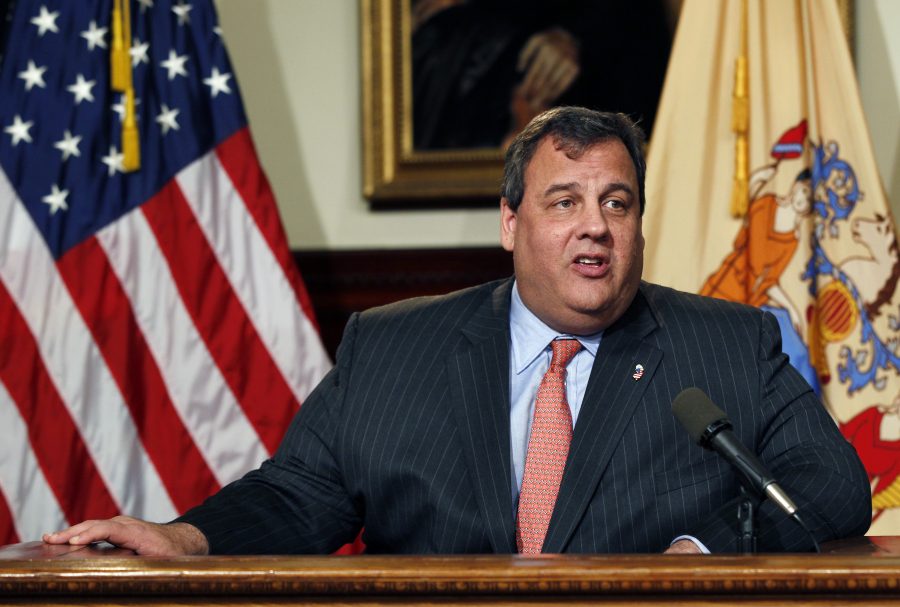As Governor Chris Christie gears up for a potential run for the Oval Office in 2016, troubles continue to brew at home for the Republican governor. Aside from Christie’s approval rating dropping steadily over the past months, from 44 percent of New Jersey voters in December having a favorable view of the governor to 37 percent in February according to a Rutgers-Eagleton poll, Christie is now facing a massive budget problem, stemming from laws he pushed for and signed regarding pension reform in 2010 and 2011. The laws were designed to pour state funds into the public pension system, which has been neglected in New Jersey for decades.
The laws passed four years ago called for over $1 billion to be contributed to the pension system by the state government each year through 2018, when the state would theoretically reach its required contribution. The 2014 amount was $1.58 billion, which was not met, and the 2015 amount was $2.25 billion, also not met. Governor Christie cited unexpected revenue shortages when he announced in 2013 that the 2014 budget would not include the full $1.58 billion to the pension fund. He instead allocated $696 million, less than half of the required amount. The public pension system in New Jersey pays the pensions of teachers and other public workers. When unions filed suit against the Christie Administration over this shortfall, a state judge decided that, due to a provision in the New Jersey Constitution stating that a balanced budget must be passed, that the full pension payment did not have to be met for fiscal year 2014. The judge would not rule on the 2015 budget at the time, as it had not been proposed.
The same thing occurred when the 2015 fiscal year budget was proposed. Instead of a $2.25 billion pension contribution, the budget only allocated $681 million. The unions again filed suit against the Administration, since the 2011 law had raised employee contributions to the pension as well, and those increased contributions were still taking place, while the governor’s end of the deal was not being met by the state. State Superior Court Judge Mary C. Jacobson, appointed by former Republican Governor Christie Whitman, ordered the Christie Administration on February 23 to pay the $1.58 billion from the 2014 budget and to find a way to fund this year’s required contribution. The Administration has vowed to appeal the court’s ruling. In addition to ordering the state to pay the pension contribution, Jacobson also ordered that the legal fees for the unions that sued be paid by the Administration. In a statement to The New York Times, Christie spokesman Kevin Roberts stated that “Once again liberal judicial activism rears its head with the court trying to replace its own judgment for the judgment of the people who were elected to make these decisions.”
Unions and state lawmakers have applauded the court’s decision, with many Democrats blaming the governor for his own woes, with State Senate President Stephen Sweeney telling The Times, “If the governor had signed the budget we presented to him last June, we would not be confronted with this massive fiscal crisis.” The budget Sweeney refers to proposed to fully fund the pension system to the amount required by law. This would have been accomplished by increasing taxes on New Jerseyans who have an annual income in excess of $1 million. The budget proposal also included a one-time corporate tax surcharge. Governor Christie used his line item veto to remove these provisions from the budget and reduce the pension payment to $681 million.
In his annual budget address on Tuesday, February 24, Christie used most of his 25-minute speech to speak about pension reform, calling the current system “broken.” He cited a pension reform commission that he appointed in calling for a complete overhaul of the system, which would freeze the current pension fund, meaning that current retirees would continue to receive pension benefits, but these benefits would not be adjusted for cost of living increases. Christie’s proposed pension reform would also increase the amount that public employees, including teachers, would pay towards health insurance, raising the average employee contribution from 18 percent to 25 percent. For fiscal year 2016, which begins July 1, 2015, Christie proposed a $33.8 billion state budget that does not meet the pension requirements of the 2011 law. The law, passed with bipartisan support and hailed by Christie as a huge success at the time, called for a $2.9 billion contribution to the pension system by the state for FY2016. Christie’s budget proposes a contribution of $1.3 billion, less than half of the required amount.
The governor’s budget address did not take up the issues of education funding nor the Transportation Trust Fund, which the state uses to fund road repair projects. Democrats harshly criticized the governor, as did the NJEA, New Jersey’s largest teachers union, for skating around the issue of education funding. In his address, Christie touted a newly refreshed relationship with the NJEA, to which the union responded with a sharp statement that the union is not actively negotiating with the governor; rather, the union is open to considering anything Christie may have to offer in terms of education policy. As for the Transportation Trust Fund, which is nearly out of money, Christie did not address the issue. This came as a surprise to analysts and politicians, as a recent study by the Federal Highway Administration found that at least 35 percent of bridges in New Jersey are structurally deficient, the sixth-highest percentage in the nation. Analysts estimate that the Transportation Trust Fund is less than six months away from complete financial insolvency, according to a report by The Star-Ledger. Democrats have proposed increasing the state’s gasoline tax, which is the second-lowest in the nation at 14.5 cents. Proposals for increase in the tax range from a 15 to 25 cent hike, which would amount to over $1 billion in additional revenue, all of which can be funneled into much-needed road repairs. Governor Christie is adamantly against tax hikes of any kind.
With a June deadline to pass a balanced FY2016 budget just months away, Governor Christie must now work with the legislature to find common ground on a plethora of financial issues, including pensions, education, and transportation. Christie called on the legislature to work with him on these issues without the need for court decisions, and even called for a state constitutional amendment on the issue of pensions, which would theoretically land on the ballot this November. The Administration’s appeal to the New Jersey Supreme Court on the pension issue is pending.






























